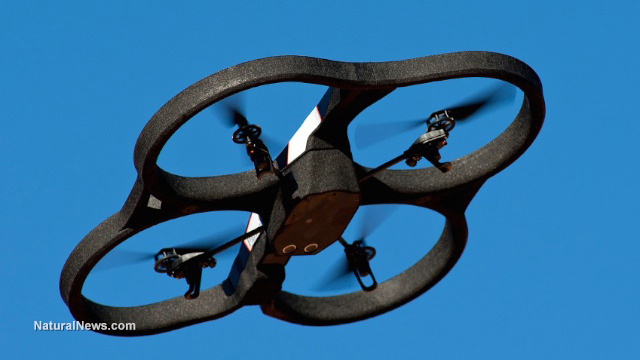Government officials alarmed by rapidly accelerating development of autonomous killer robots
Monday, February 01, 2016 by: Daniel Barker
Tags: killer robots, autonomous weapons, Geneva Conventions

(NaturalNews) It's difficult - particularly for observers of a certain age and cultural background - to resist drawing the obvious comparisons between science fiction and the reality which is now unfolding regarding the development of autonomous weapons systems, e.g. "The Rise of the Machines" and "Skynet."
Sci-fi references or not, it truly is a little spooky to live in a world with organizations (that are actually taken seriously) having names like the 'Campaign to Stop Killer Robots' - a name which, of course, sounds like it was lifted straight out of an Isaac Asimov novel.
'Campaign to Stop Killer Robots' co-founded by Human Rights Watch and other prominent NGOs
In fact, that organization was co-founded by Human Rights Watch, the Nobel Women's Initiative and other eminent national and international NGOs.There is legitimate and widespread concern about the development of "killer robots," autonomous drones and missiles, and other weaponry either already being deployed or currently under development.
The issue has become so relevant that the UN recently held a special meeting in Geneva to address the concerns. Participants included representatives from several European nations and other countries who met to discuss how to monitor and regulate the use of these technologies, which have the potential to cause great harm.
Can autonomous weapons ever meet Geneva convention standards?
Delegates at the meeting debated on topics including whether or not these new weapons conform to Geneva convention rulings on 'proportionality' and whether or not autonomous weapons should be banned completely.The United States is at the forefront of the technology, with most of its aerial surveillance capabilities already being partly automated and with new fully-autonomous weapons in testing and development.
The technology is advancing so rapidly that some observers are foreseeing a new type of arms race based on developed countries vying with each other to stay one step ahead in terms of robotic weaponry.
Even some of the most advanced developers of artificial intelligence systems, such as Tesla Motors' Elon Musk, warn of a future where autonomous machines may play an increasingly threatening role toward humankind.
Indeed, there have already been a significant number of incidents in which partially-autonomous U.S. weapons have been responsible for the deaths of innocent civilians in war zones, particularly in the Middle East.
The less direct human control over these weapons, the greater the chance that they will end up harming those who are not intended targets.
The meeting in Geneva was the second this year addressing the issue of autonomous weapons, which indicates how grave the concerns are for members of the international diplomatic community.
UN tries to keep pace with technology
As the technology races ahead, it is necessary to examine all the implications, not only regarding the danger to innocent civilians but also those involved on the battlefield. There are questions concerning whether these weapons are essentially inhumane, even when used against armed enemy combatants.As the Campaign to Stop Killer Robots' website states, "there are numerous ethical, legal, moral, policy, technical, and other concerns with fully autonomous weapons."
Under the rules of the Geneva Convention on Conventional Weapons as amended in 2001:
"...the principle of international law that the right of the parties to an armed conflict to choose methods or means of warfare is not unlimited, and...prohibits the employment in armed conflicts of weapons, projectiles and material and methods of warfare of a nature to cause superfluous injury or unnecessary suffering."
That prohibition would certainly seem to apply to many of the autonomous weapons now being used and developed by the U.S. and others.
The decision at the conclusion of the Geneva meeting this month was to continue deliberations on the issue. There will be another set of talks at the UN in Geneva in April 2015 to further explore solutions to the problem.
It is hoped that the member states will reach some binding agreements strictly regulating, if not altogether banning, the use of killer robots and other autonomous weapons systems.
Sources for this article include:
http://www.theguardian.com
http://www.stopkillerrobots.org/
http://www.unog.ch
Killer robots at FETCH.news
Get independent news alerts on natural cures, food lab tests, cannabis medicine, science, robotics, drones, privacy and more.
Take Action: Support Natural News by linking to this article from your website
Permalink to this article:
Embed article link: (copy HTML code below):
Reprinting this article:
Non-commercial use OK, cite NaturalNews.com with clickable link.
Follow Natural News on Facebook, Twitter, Google Plus, and Pinterest
- Curcumin’s ancient healing power supercharges muscle recovery, and its effects are compounded with anti-inflammatory foods and supplements
- China’s counter-tariff strategies: A new chapter in the U.S.-China trade war
- Mysterious underwater pyramid off Japan could rewrite ancient history
- Aerosolized bioweapons? Strange “diploid biomasses” falling out of the sky in Florida captured under the microscope
- Chemtrails unveiled: How the CIA and Big Business are manipulating the weather for profit
- WHO conducts a 2-day pandemic simulation called ‘Exercise Polaris’ - bringing together 350 predatory health groups worldwide
- Fauci is back in the limelight, and he’s busy promoting a future COVID or FLU pandemic
- Tulsi Gabbard leads charge against the Biden regime’s global censorship of the 'Disinformation Dozen'
- Kiss Your Genetic Privacy Good-Bye! 23andMe Gets Green Light to Sell Your Intimate Genetic Details to Anyone They Want
- U.S. lawmakers investigate Meta over alleged China collaboration
- Analysis: The coming economic collapse, a mass uprising and Trump's three secret weapons to halt the growing revolt
- Widespread social and economic unrest: Steve Quayle issues urgent financial warning of imminent asset collapse in new interview with Mike Adams
- Mike Adams releases country western hit single: Goin’ Back in Time is Comin’ Home
- New study confirms brown rice contains 40% more toxic arsenic than white rice, putting young children at risk
- Tulsi Gabbard takes aim at censorship: Justice for the ‘Disinformation Dozen’
- How Israeli military-connected corporations are secretly controlling your online privacy
- DEADLY FLU JAB WARNING: New flu vaccines make recipients 27 PERCENT MORE LIKELY to catch the flu
- Over 30 pieces of evidence on how ‘the climate scam is collapsing’
- Aerosolized bioweapons? Strange “diploid biomasses” falling out of the sky in Florida captured under the microscope
- Widespread social and economic unrest: Steve Quayle issues urgent financial warning of imminent asset collapse in new interview with Mike Adams
- Analysis: The coming economic collapse, a mass uprising and Trump's three secret weapons to halt the growing revolt
- Kiss Your Genetic Privacy Good-Bye! 23andMe Gets Green Light to Sell Your Intimate Genetic Details to Anyone They Want
- CLOT SHOT PLANDEMIC UNFOLDING: Fibrous, rubbery clots caused by covid injections have prion-like seeding activity
- Defunding DEADLY mRNA jabs: Government funding for mRNA technology being scrutinized and sidelined until proven "safe and effective" for real
- Mike Adams releases country western hit single: Goin’ Back in Time is Comin’ Home
- How Israeli military-connected corporations are secretly controlling your online privacy
- DEATH by VACCINE or face PRISON time: Canadian Freedom Convoy leaders CONVICTED for protesting forced vaccination during the Covid Plandemic
- European Court of Justice: Healthcare professionals who promoted or administered COVID-19 vaccines are CRIMINALLY LIABLE for any harm caused
- Tulsi Gabbard leads charge against the Biden regime’s global censorship of the 'Disinformation Dozen'
- Fauci is back in the limelight, and he’s busy promoting a future COVID or FLU pandemic
- Tulsi Gabbard takes aim at censorship: Justice for the ‘Disinformation Dozen’
- The hidden war above: Chemtrails, HAARP and the battle for planetary control
- “Project Aldrin”: Senate probes Meta's alleged censorship dealings with China
- Federal employees whine over DOGE's new directive requiring them to do a 5-point summary of weekly accomplishments
- U.S. approves new Russian ambassador as diplomatic thaw continues
- I Want My Bailout Money – new song and music video released by Mike Adams
- Newly released JFK files reveal Pentagon's role in creating Lyme disease and covid in the same lab
- Mike Adams releases country western hit single: Goin’ Back in Time is Comin’ Home
- Analysis: The coming economic collapse, a mass uprising and Trump's three secret weapons to halt the growing revolt
- Dr. Mike Yeadon releases 15-minute testimony - WATCH - about genocidal intent of COVID “vaccines”
- MEDICAL BOMBSHELL: FDA admits Covid mRNA 'Vaccines' CAUSE CANCER
- The Health Ranger releases “Vaccine Zombie” song and music video, using AI-animated zombies for the music video
- California's social media censorship law struck down: A victory for free speech or a threat to online safety?
- EPA advisor admits the agency is funneling billions to climate groups ahead of Trump’s return to White House
- Trump reverses course on Gaza plan, says “nobody is expelling Palestinians”
- Survival 101: Effective EMF blocking techniques
- Rep. Nancy Mace introduces bill to ban biological males from female facilities on federal property
- OpenAI whistleblower who dissented against how the company trained ChatGPT found dead
- 5 Simple steps to boost your brainpower: How to strengthen executive function in a distracted world
- CONSERVATIVES SOUND THE ALARM: Big Pharma and the Left trying to force $32 billion money grab from America’s seniors into year-end spending deal
- Florida takes a stand: DeSantis proposes permanent ban on mRNA vaccine mandates
- Sugarcane extract superior to cholesterol-lowering drugs?
- Pilots report mysterious lights 'moving at extreme speeds' across Oregon skies
- Trump Administration cuts 2,000 USAID jobs, places most employees on leave in sweeping reform effort
- Red Cross issues warning to stop blood plasma donations from vaccinated people
- Scientists confirm: GENIUS brain function can be spontaneously unleashed in humans without any apparent cause
- EPA advisor admits the agency is funneling billions to climate groups ahead of Trump’s return to White House
- HYSSOP: What research reveals about the health benefits of this ancient holy herb
- Two containers with completed ballots fall out of truck in Florida
- Fully vaccinated about to see “tsunami” of illness and death, warns virologist
- Global leaders unite to clamp down on “misinformation” with UN-backed Cascais Declaration
- Newly released JFK files reveal Pentagon's role in creating Lyme disease and covid in the same lab
- BREAKING: 2025 NDAA authorizes mandatory military draft of WOMEN across America… as Pentagon pursues global NUCLEAR war with both Russia and China at the same time
- Michael Yon warns of a ZIONIST TAKEOVER in Trump’s second administration
- Ozempic and Wegovy weight loss drugs are injectable LIZARD VENOM PEPTIDES that may unleash a devastating wave of organ failure… side effects align with symptoms of SNAKE BITES
- The Health Ranger releases “Vaccine Zombie” song and music video, using AI-animated zombies for the music video
- BOMBSHELL: DNA testing kits are a SCAM to develop ethnic-specific bioweapons
- Israeli soldiers accused of even more torture and abuse in the West Bank
- These 13 countries just signed an agreement to engineer a global FAMINE by destroying food supply
- NASA admits that climate change occurs because of changes in Earth’s solar orbit, and NOT because of SUVs and fossil fuels
- RFK Jr. clears key hurdle: Sen. Susan Collins backs controversial HHS nominee, signaling a new era for health policy
- Sermon 30: How Jesus reveals Caesar’s FAKE CURRENCY and FALSE AUTHORITY
Science News & Studies
Medicine News and Information
Food News & Studies
Health News & Studies
Herbs News & Information
Pollution News & Studies
Cancer News & Studies
Climate News & Studies
Survival News & Information
Gear News & Information
News covering technology, stocks, hackers, and more



"Big Tech and mainstream media are constantly trying to silence the independent voices that dare to bring you the truth about toxic food ingredients, dangerous medications and the failed, fraudulent science of the profit-driven medical establishment.
Email is one of the best ways to make sure you stay informed, without the censorship of the tech giants (Google, Apple, Facebook, Twitter, YouTube, etc.). Stay informed and you'll even likely learn information that may help save your own life."
–The Health Ranger, Mike Adams












































